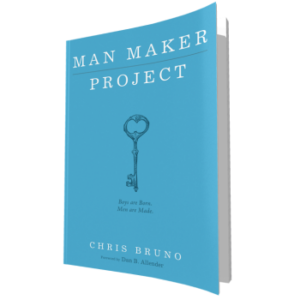Fathering from the Glory and Pain of Your Own Story

Chris Bruno, a counselor in Colorado and a 2010 graduate of the MA in Counseling Psychology program at The Seattle School of Theology & Psychology, has recently published a new book, Man Maker Project: Boys are Born, Men are Made. Here, Chris shares what wrestling with his own story has taught him about fathering. You can learn more about the book and the work Chris does in this interview.
“If you are endeavoring to lead your son into the choppy waters of masculinity, few things are more vital than an intentional look at your own heart’s depravity and glory. A bold reflection on your own story, and the healing of those places that remain unfinished or devastated, will launch you toward the fullness of God’s design for men. Simply put, have the guts to do your own work.” (Man Maker Project, p. 15)
I have worked in the corporate world, served as a missionary in the Middle East during 9/11 and the Iraq War, been physically assaulted with a knife, started a small business, launched a nonprofit, moved across the country multiple times, and suffered deep loss at the early death of several friends, but nothing has terrified or paralyzed me more than fathering my own son. Fathering him has required more of me than any other adventure or tragedy in my life, because it has demanded that I first face my own father-story with an intensity and intentionality I would rather flee than engage.
As a boy, I lived the typical American life. My parents more than adequately provided for my needs. I had friends, lived in the suburbs, and did well in school. I even had a horse. From the outside looking in, I had nothing to complain about. Any time the haunting ache of father-hunger emerged from my soul, I quickly squelched it, denying the longing and telling myself to simply move on. It is the story of most men in my generation.
I continued to live as if all was well, until I married and had a son of my own. His arrival in my world required that I now call myself father, and the weight this title carried sent my soul into a tailspin. What is father? Who is father? Who am I as father? What does it mean to father? And finally, with the force of a left upper jab to the jaw, How was I fathered? I realized that in order to father him, I myself still needed to be fathered. I had to name my ache. And I hated it.
 Intentional fathering requires an uncommon courage, a heightened level of bravery to truly investigate and name the glory and pain experienced in our own narratives as boys. In my conversations with men about their father-stories, the most frequent sentence I hear is, “My dad did okay. He did the best he could.” Yes, I’m sure he did. But underneath this platitude lurks an unnamed desire, a longing that has gone unmet for far too long, and a hunger that has been more denied than fed. No child wants an “okay” dad. Every child longs for a dad to know, see, pursue, hope, envision, create, and bless. But far too often, we (especially men) deny the emptiness that still lingers in our souls for fear of indicting our fathers for their lack. By refusing to name our pain, we allow it to live unchallenged and unhealed.
Intentional fathering requires an uncommon courage, a heightened level of bravery to truly investigate and name the glory and pain experienced in our own narratives as boys. In my conversations with men about their father-stories, the most frequent sentence I hear is, “My dad did okay. He did the best he could.” Yes, I’m sure he did. But underneath this platitude lurks an unnamed desire, a longing that has gone unmet for far too long, and a hunger that has been more denied than fed. No child wants an “okay” dad. Every child longs for a dad to know, see, pursue, hope, envision, create, and bless. But far too often, we (especially men) deny the emptiness that still lingers in our souls for fear of indicting our fathers for their lack. By refusing to name our pain, we allow it to live unchallenged and unhealed.
Richard Rohr states, “If we do not transform our pain, we will transmit it in some form.” As a man, it is easy to fall into the small stories peddled by our society as worthy of a man’s life: work hard and succeed, buy big toys that go fast, focus on retirement and be a good, nice guy. Far too many men swallow this enticing story hook, line, and sinker, and choose to live under a veneer of denial. The truth is, they remain unfinished and hungry. Untransformed pain from our fathers, whether from his absence, vacancy, or violence, will inevitably be transmitted to our sons.
“If I have any hope of ushering my son into his manhood, I must believe that God, by his restorative design, will also usher me into mymanhood. The more I can engage my own story, my own journey, and my own masculine narrative, the more I can provide my son the freedom to discover his.” (Man Maker Project, p. 14)
I can only take my son as far as I myself have gone. I live among a generation of men who recognize the importance and value of fathering well. Many men I know want to change the course of history by intentionally shaping the future for our sons. Too often, however, we create empty programs and anemic lessons that are removed from the power of our own narratives. Our sons were born into an already-existing story—our story—and in order for them to know who they are, we need to know who we are.
The first step to fathering the next generation of men is to plumb the depths of glory and pain in our own stories. From this place of freedom, we can usher our sons into a manhood we can come to know together.
“You do not need to be a perfect man to father well. But you do need to be an honest man who boldly and truthfully enters his own father-story, seeking restoration in your own soul as you seek to strengthen the soul of your son.” (Man Maker Project, p. 14)
Chris Bruno is the director of the Restoration Counseling Center of Northern Colorado and the president of Restoration Project, a ministry dedicated to calling men to heal their wounds, know their God and restore their world. He is the author of the recently released book Man Maker Project: Boys are Born, Men are Made. He received a Master of Arts in Counseling Psychology from The Seattle School of Theology & Psychology in 2010.
